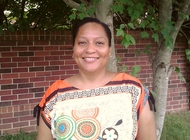|
By Angiemil Pérez Peña, See the Triumph Guest Blogger Walking into the local shelter for someone experiencing domestic violence can be hard. Reaching out for help to the local community agency or navigating the local resources can be overwhelming for a local resident, but how much more daunting is it to navigate for an immigrant women? When seeking help for an abusive relationship, many immigrants experience increased difficulties and additional barriers for individuals in this group to exit their abusive relationship. The existing research tells us that documented immigrants, and even moreso for undocumented immigrants, are much less likely to report domestic violence to the police, compared to their non-immigrant counterparts.(1) Some of the barriers that immigrants experience when they do reach out for help include lack of fluency or speaking the dominant language, immigration status, financial dependency on their partners, lack of knowledge about their legal rights, not desiring to perpetuate negative stereotypes of their culture, and the lack of existing culturally appropriate services. Additionally, abusers may exploit these vulnerabilities to keep the victim in the relationships. When you consider the threats immigrant victims may receive--such as the abuser keeping their legal documents, threatening to call immigration and take away the children, refusing to file immigration papers, and denying access to legal documents, to name a few--you begin to understand the added difficulty for immigrant women leaving domestic violence. Changing the accessibility of resources for immigrant victims of domestic violence will take the involvement of the entire community. We need to continue to reinforce the idea that domestic violence is a social problem, and we all have to take part of the solution. This includes educating members and leaders of vulnerable communities to think of more social justice solutions. If you’re in a position to help an immigrant who is experiencing an abusive relationship, consider the following suggestions. First, help the person to consider ways to promote their safety, whether or not they leave the relationship. Second, think of the cultural strengths that individuals belonging to collectivistic culture may have, such as social support and having support family members that could help to protect them from an abuser. Third, educate yourself on specific resources available regarding immigration, protective laws such as VAWA, and additional local community resources. Fourth, make every effort to provide services in the native language or work with interpreters who are trained to understand domestic violence. Lastly, strive toward becoming culturally responsive to the needs of underserved populations. Working together, we can foster communities that offer support and safety for immigrant survivors of domestic violence. Reference: 1: Sokoloff, N. J. (2008). Expanding the intersectional paradigm to better understand domestic violence in immigrant communities. Critical Criminology: The Official Journal of the Asc Division on Critical Criminology and the Acjs Section on Critical Criminology, 16, 4, 229-255.  Angiemil Pérez Peña is a graduate student at The University of North Carolina at Greensboro studying Couple & Family counseling. By Michelle Vann Horton, See the Triumph Guest Blogger
Places of worship are often viewed as safe havens, a refuge for those in need. This perception has been no different for many immigrant victims who suffer from intimate partner violence. Many times, immigrants reach out to their religious leaders first before seeking professional sources of support. This sounds like a good idea, since religious institutions play a vital role in helping immigrants maintain their cultural identity and stay connected to others. Can we assume that religious leaders who shares a similar cultural background would be empathetic to immigrant victims of intimate partner violence? Unfortunately, in many cases, this is not what happens. In reality, many religious leaders react negatively or are unsupportive to victims of abuse. There are many reasons this may happen. First, many religions promote a harmful patriarchal point of view, which promotes male domination over women. From this lens, gender norms are established where sexual inequality is accepted and upheld in families throughout generations. Second, group-oriented cultural ideologies often prioritize the advancement of the community, family unit, or marriage over the wellbeing of the self. In addition, cultural definition and perceptions of intimate partner violence can vary greatly, and in many immigrant communities, these issues are not even acknowledged. Together, these cultural views can contribute to the negative reactions religious leaders may project as they silence victims or blame the victims’ behavior as cause for the violence (i.e., victim-blaming). Leaders may relay the message that it is the victims’ responsibility to stop the violence and imply that victims’ abuse results from their failing in their relationship with God. It is important for immigrant victims of family violence to surround themselves with multiple sources of support, especially people and organizations that have expertise with helping people impacted by violence and abuse. I know this may be easier said than done, especially with the overwhelming barriers immigrant populations face daily, like language barriers, discrimination, adjusting to mainstream culture, and lacking knowledge about U.S. laws and available support systems. Due to these barriers, it is vital that community agencies have the training and the staff needed to meet the culture-specific needs of the growing immigrant population in the U.S. Moreover, it is imperative that domestic violence agencies also connect with religious institutions and leaders that serve immigrant communities in order to become more proactive in removing the stigma associated with family violence, especially within places of worship. As agencies partner with religious institutions, religious leaders can increase their competence in supporting victims and survivors, as well as create community norms that promote safe relationships and families. In addition, prevention and educational programs can be implemented that honor and respect cultural norms while reframing the ideals of what a healthy marriage and family looks like. Ultimately, religious leaders have the power to confront controversial issues like family violence in their preaching and in their teachings. The ability to take a stand against family violence while at the pulpit sends a direct message to congregants that promotes survivors’ safety and holds abusers accountable. |
Archives
July 2024
CategoriesAll About Intimate Partner Violence About Intimate Partner Violence Advocacy Ambassadors Children Churches College Campuses Cultural Issues Domestic Violence Awareness Month Financial Recovery How To Help A Friend Human Rights Human-rights Immigrants International Media Overcoming Past Abuse Overcoming-past-abuse Parenting Prevention Resources For Survivors Safe Relationships Following Abuse Schools Selfcare Self-care Sexual Assault Sexuality Social Justice Social-justice Stigma Supporting Survivors Survivor Quotes Survivor-quotes Survivor Stories Teen Dating Violence Trafficking Transformative-approaches |
Search by typing & pressing enter







 RSS Feed
RSS Feed